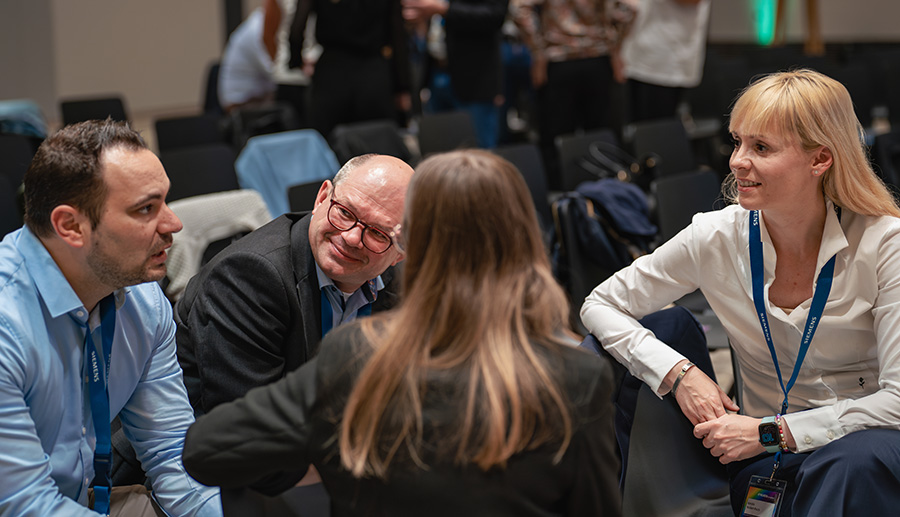At People Mobility Alliance, our dream is to bridge the gap between companies and employees. By doing this, we can create a new framework for mobility that is both rewarding to those individuals living it and beneficial to the businesses enabling it.
One way we connect people is through conference events. Not only hosting our own, but attending other relevant events to our sector and showing support within our own networks. Our Managing Partner, Stefan Remhof and PMA affiliate Iaroslav Mynov recently went to the Siemens Global Mobility Conference #TRENDSformation in Erlangen.
The event brought together experts like Meike Geiken, Kerstin Wollert-Risch, Tobias Nehls, and Nikole Eriksen from Siemens, focusing on the future of global mobility and innovative industry solutions.
Stefan took part in a panel discussion on the topic of “Overcoming the Generational Gap in Business: Challenges and Chances in Global Mobility” alongside Rachel Doak and Ewelyn Sengebusch from Siemens. Together, they explored the values, expectations, and work styles of Gen Z, Millennials, Gen X, and Baby Boomers.
Other key topics at #TRENDSformation included the rise of virtual assignments, integrating data with people strategies, repatriation in the expat life cycle and the impact of Diversity, Equity and Inclusion (DEI).
We want to share our experiences with you, so in this blog, we will highlight our biggest takeaways from this interesting event.

#TRENDSformation: At the centre of Global Mobility
Held at the Siemens Campus in Erlangen, the #TRENDSformation conference brought together leaders from Siemens and other partners to discuss the latest trends and challenges in global mobility. The event was packed with discussions, breakout sessions and networking opportunities. It truly highlighted the importance of exchanging ideas, best practices and finding solutions together.
Takeaway 1: Focus on Assignee Experience
One session highlighted the importance of focusing on the individual assignee experience. In global mobility, this is crucial for employee satisfaction, retention, productivity, cultural adaptation, and company reputation. A positive assignee experience can also lead to cost efficiency, knowledge transfer, innovation, and improved well-being.
For more insights, listen to our podcast episodes on “Positive Psychology and Expat Management” and “Mental Challenges in Global Mobility.”
Takeaway 2: The Rise of Virtual Assignments
Repatriation is a critical phase in the expat lifecycle, ensuring that skills and experiences gained abroad are reintegrated effectively into the organisation. However, challenges like reverse culture shock, career progression concerns, and family readjustments were also discussed.
Check out our podcast on “Cross-Border Solutions in the Digital Age” for more on this topic.
Takeaway 3: Repatriation in the Expat Lifecycle
Repatriation is a critical phase in the expat lifecycle, ensuring that skills and experiences gained abroad are reintegrated effectively into the organisation. However, challenges like reverse culture shock, career progression concerns, and family readjustments were also discussed.
Check out our podcast on “Repatriation and Reintegration: Challenges for Expats” for more details.
Takeaway 4: The Impact of Diversity, Equity and Inclusion (DEI)
Diversity, Equity, and Inclusion (DEI) are becoming essential in global mobility. At the conference, experts discussed how DEI initiatives help attract and retain a diverse talent pool, which is crucial in a global context. DEI also boosts cultural competence, enabling employees to adapt better to different environments during international assignments.
Furthermore, DEI initiatives contribute to higher employee engagement and well-being, which are vital for the success of global mobility programs. By fostering a sense of inclusion, companies can enhance both employee satisfaction and organisational performance.
Takeaway 5: Linking Data to People Strategy
Integrating data into a people strategy involves using data-driven insights for talent management, organisational development, and workforce planning.
There are 5 key steps to integrating data into your people strategy:
- Collect relevant data on employees, the HR function and the business performance to get a comprehensive overview.
- Analyse the data collected and interpret using analytics tools to identify trends and forecast future HR needs.
- Use the data analysis to make informed decisions on strategies to improve talent acquisition, employee development and performance management.
- Create a more personalized employee experience including personal development plans and support programs.
- Measure the impact and ROI of your HR initiatives using data and adjust your strategies based on feedback and results.
Taking a modern, data-driven approach to people management ultimately leads to better efficiency, talent management, organisational performance and employee satisfaction.
For a deeper dive into this topic, explore our podcast with Alex Lieder that touches on this topic.

Expertise in Action
At People Mobility Alliance, our expertise in global mobility, leadership, and mindset is evidence-based and actively applied in our consulting approach. The #TRENDSformation conference was a valuable experience, reaffirming our commitment to advancing global collaboration and the people mobility sector.
The key takeaways from the event highlight the importance of agility in both talent and organisational structures, the competitive advantage provided by skills, the essential role of data-driven people strategies, the need to integrate repatriation into the expat lifecycle, and the increasing relevance of virtual assignments.
As we continue to shape the future of global mobility, we are excited to be at the forefront of these developments. We extend our gratitude to the organisers for their kind invitation and look forward to contributing to the ongoing evolution of people mobility.






